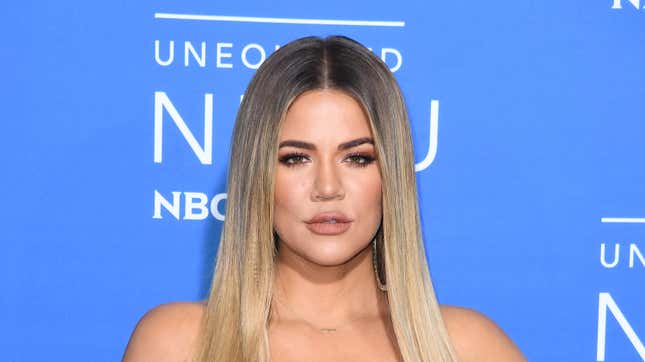Khloé Kardashian's Bikini Photo Is This Week's Cinnamon Toast Crunch Shrimp Tails
Latest

Earlier this week, someone posted a fully clothed picture of Khloé Kardashian to social media that featured lighting she did not like, so she used her vast financial resources and access to teams of legal representatives to have the picture removed. That is both the entire story and a jumping-off point for a larger marketing push allowing the Kardashian family to do what they do best: Spin a days-long story out of nothing.
On Easter Sunday, the Kardashian/Jenner sisters celebrated the holiday by publishing obviously edited photographs of themselves in swimsuits to social media. According to tabloid rumor and cease and desists posted to Twitter, the bikini photo Khloé did not like was posted by Kardashian/Jenner grandmother MJ Shannon. However, a statement by Tracy Romulus, chief marketing officer of Kim Kardashian’s KKW Brands, claims the “private” picture was accidentally released into the world in error by “an assistant”:
“The color edited photo was taken of Khloé during a private family gathering and posted to social media without permission by mistake by an assistant,” the statement to Page Six read. “Khloé looks beautiful but it is within the right of the copyright owner to not want an image not intended to be published taken down.”
Page Six also reports that several accounts which reposted the photo were asked to remove the “unauthorized” image under threat of legal action. The same photo which was, if the statement from Romulus is to be believed, posted by a member of the Kardashian team. These threats coupled with the fact that the Kardashians’ marketing strategist released a statement to the media, a move that drew international attention to the photo the family ostensibly wanted to hide, kept Khloé on the front page of both gossip blogs and women’s magazines for two days. In addition to the photo itself, the marketing team’s statement about the photo kicked off a “debate” about whether Khloé’s photograph was good or bad for the body positivity movement, just long enough for sister Kim to claim those spots by announcing her own forthcoming skincare line.
-

-

-

-

-

-

-

-

-

-

-

-

-

-

-

-

-

-

-

-

-

-

-

-

-

-

-

-

-

-

-

-

-

-

-

-

-

-

-

-








































